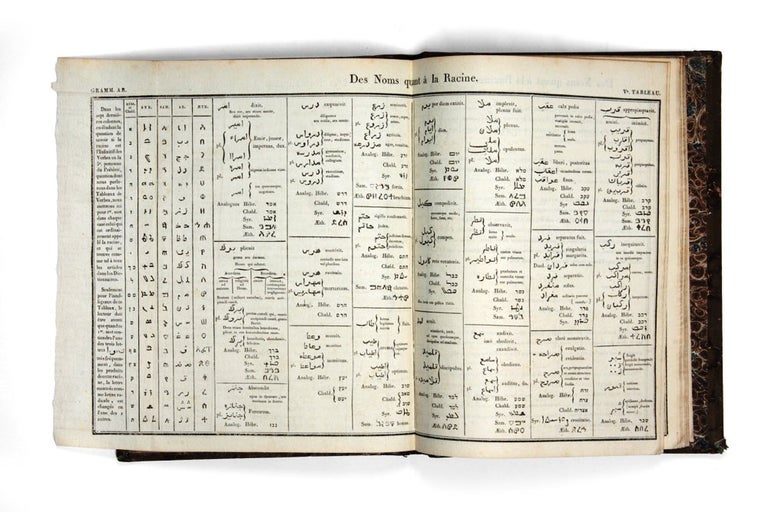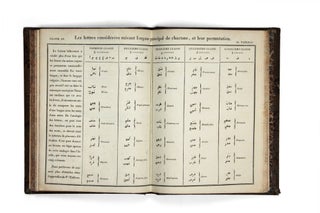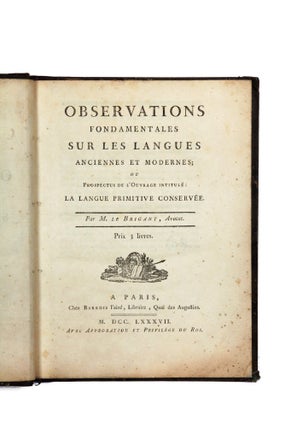Observations Fondamentales sur les Langues Anciennes et Modernes…
Observations Fondamentales sur les Langues Anciennes et Modernes; ou prospectus de l'ouvrage intitule la langue primitive conservee.
Paris: Barrois, 1787.
Quarto, 112pp, bound with two later Hebrew and Arabic grammars, in early nineteenth-century quarter calf (spine scuffed).
Eccentric Tahitian linguistics
A rare and eccentric treatise promoting Celtic as the foundation for all languages ancient and modern. The work includes a chapter on Tahiti based upon vocabularies in the voyage accounts of Bougainville and the account of Cook's second voyage published by Georg Forster, who accompanied his father Johann Reinhold Forster on the Resolution.
A rare and eccentric treatise promoting Celtic as the foundation for all languages ancient and modern. The work includes a chapter on Tahiti based upon vocabularies in the voyage accounts of Bougainville and the account of Cook's second voyage published by Georg Forster, who accompanied his father Johann Reinhold Forster on the Resolution.
Jacques le Brigant (1720-1804) was a lawyer and keen amateur archaeologist who surveyed and unearthed ancient sites in England and his native province of Brittany. Le Brigant boldly promoted his hypothesis that the ancient language of Brittany was the original Celtic tongue, being composed from pure monosyllabic elements. Yet, like many pioneers of grand historical derivation so fashionable throughout the eighteenth-century, le Brigant went further and expanded his theory to encompass all the languages of the world. The result is an extraordinary book that attempts to prove the common origin of disparate languages including Chinese, Sanskrit and Caribbean, through an admittedly naïve and simplistic process of phonetic comparison. Such speculative theories, so beloved of dilettante scholars such as le Brigant, faced inevitable extinction with the rise of anthropology and scientific linguistics in the mid-nineteenth century.
Le Brigant based his phonetic comparisons upon vocabularies from published voyage accounts. The chapter on Tahiti uses word lists from the account of Bougainville who visited Tahiti in 1768, and also from the description by the brilliant naturalist Georg Forster who joined Cook on his second voyage of discovery through the Pacific between 1773-1775. There are two tables for phonetic comparison while a third table compares the spelling of common terms in the texts of Bougainville and Forster. The third table is important given the theory hinges upon phonetic comparison as the etymology of the Tahitian language was not understood. This extraordinary attempt at linguistic and cultural derivation is not hampered by the fact that Polynesian is not a written language. Similarly, the analysis of Chinese and Celtic in this book proceeds with romanised Chinese terms rather than characters (being European interpretations of Chinese words, rather than pure forms).
Despite these obvious limitations, le Brigant's enthusiastic optimism is both charming and engaging. The book demonstrates the diverse audience who read contemporary voyage accounts and an esoteric application of fresh knowledge from the farthest corners of the earth. Le Brigant continued to expand his opus, publishing a related text on Celtic origins in Strassbourg in 1779.
O'Reilly, 5710.
Condition Report: Half-title and final two leaves a little chipped, a little foxing and browning yet very good.
Price (AUD): $2,400.00
US$1,561.81 Other currencies




